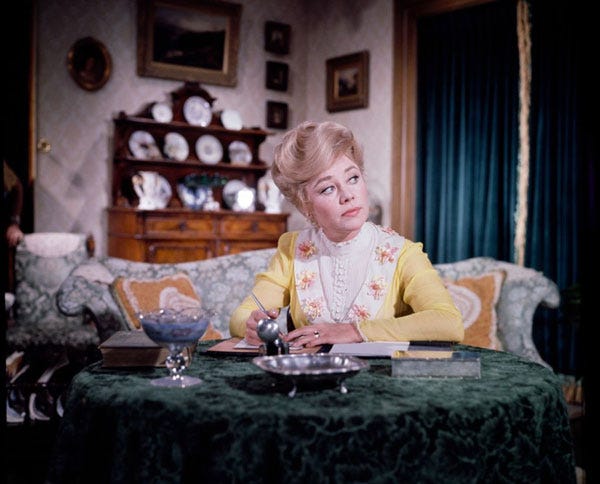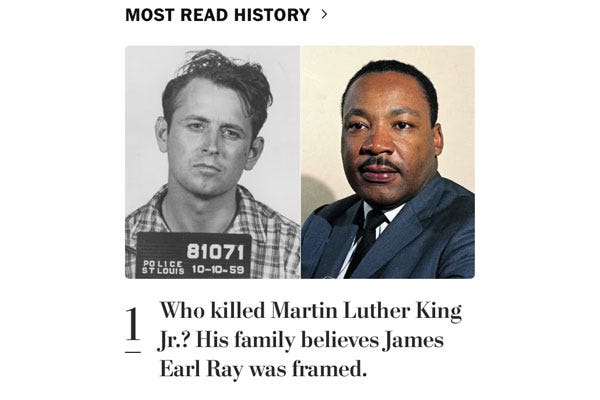Wednesday Walk: Humanity and Conspiracy
Talking with a Gazan journalist, alternative facts on MLK, the longevity movie
Welcome to Willoughby Hills!
If you enjoy what you’re reading, please consider a free subscribtion to receive emails every Wednesday and Sunday plus podcast episodes every two weeks. There are also paid options, which unlock even more features.
Every Wednesday, I offer a few short ideas that I hope will inspire you to do some more reading, thinking, and exploring. Let’s take a little walk together and see where the path leads…
Remembering Humanity
Last week in this column, I shared several resources for further education on the situation in Gaza and urged folks to speak out. One of the items that I shared as part of that was a profile in The Washington Post of Palestinian journalist Plestia Alaqad.
In that piece, I had learned that Plestia had fled Gaza through Egypt and was now living in Australia. I also noticed that she seemed to be doing several English language interviews about her time in Gaza.
On a bit of a whim, I decided to try to locate an email address for her and decided to reach out to invite her to be a guest on my podcast. I never know when I’m emailing somebody if my message will even get read, if it will go to the intended recipient, or if it will go to some intermediary like a manager, publicist, or assistant. I’ve also learned that enough people have said yes when I email out of the blue that it’s always worth trying.
To my surprise, not only did my message directly reach Plestia, but she sent me a very nice return email in which she politely declined an interview. We ended up exchanging a few more emails back and forth about the current war and me wanting her to know that the actions of the U.S. government don’t speak for all American citizens.
What struck me most about our exchange was not just that she took the time to respond at all (which was huge), but that she did so with such grace and warmth.
At a time when Western media tries to dehumanize Palestinians and convince Americans that Israeli attacks are justified because every Palestinian citizen is considered a “terrorist,” it was nice to have an explicit reminder that that narrative is completely untrue. The Plestia I spoke with privately over email is filled with the same humanity as her public image on social media. Considering all that she has witnessed and experienced over the last three months, her kindness in an email exchange was quite a testament to her perseverance.
I have had a lot of very humbling experiences since launching this podcast and newsletter nearly four years ago, but being able to share even a brief exchange with a hero like Plestia is near the top of unexpected, wonderful surprises. She risked her life and the safety of her family to share the truth with the world, and I am grateful that I was able to thank her for those efforts and express my gratitude to her directly for her work and the work of all the other Gazan journalists.
Who Killed Dr. King?
On Martin Luther King Day, I happened to be looking at The Washington Post website when I noticed an interesting trending article.
The number one article in the history section is titled “Who killed Martin Luther King Jr.? His family believes James Earl Ray was framed.”
It’s a bit surprising that this article is still so popular, as it was written by Tom Jackman in 2018, although it was new to me. Jackman looks at the case that the FBI or another government entity may have been involved in King’s murder, with James Earl Ray either willingly or unsuspectingly taking the hit for it.
I have been to the National Civil Rights Museum in Memphis, which is located on the site of the Lorraine Motel where King was killed. They have preserved King’s hotel room as it would have looked. They have an exhibit in the boarding house across the street where Ray was staying at the time. They even have the gun on display that was supposedly used to kill King (which is actually a bit morbid now that I think back on it).
At any rate, the narrative seemed clear at the museum that Ray was the aggressor and that he acted alone. But according to Jackman’s article, King’s family has other theories.
The King family brought a court case in 1999 in which a jury found that the local, state, and federal governments were responsible for the death of Dr. King, not James Earl Ray, but Ray was never exonerated and died in prison.
“There is abundant evidence,” Coretta King said after the verdict, “of a major, high-level conspiracy in the assassination of my husband.” The jury found the mafia and various government agencies “were deeply involved in the assassination. … Mr. Ray was set up to take the blame.”
The entire article is worth a read and worth pondering. As new files get released in the Jeffrey Epstein case or we learn one reality about the Israel-Hamas war from politicians and media and see another reality on social media, I am open to the notion that maybe conspiracy theories aren’t just theories even if I’m not quite a true believer yet.
At any rate, I think this one merits some more consideration on all of our parts.
The Strange Longevity of Mary Poppins
The first movie that I distinctly remember falling in love with was Mary Poppins. I had a bootlegged VHS copy that I watched nearly every day of my early childhood (I believe my grandpa made it for me by taping it off of a rental tape). My parents helped me identify it by drawing a large circle on the spine label with a red crayon.
A few years ago, my cousin (who is an animator at Disney) gave me a tour of the Burbank lot, including the outside of Stage 1 where Mary Poppins was filmed back in 1964.
Being on the same lot where Walt Disney once walked and where this classic film was created was a bit disorienting, in part because it felt like the Poppins era was ancient history.
A few months ago, I saw a post celebrating the 100th birthday of Glynis Johns, who played Mrs. Banks in the original film. I had to look it up because it was startling to think she was still alive.
According to her Wikipedia entry (so take it with a grain of salt), not only was she still alive at the time, but:
“With the death of Olivia de Havilland in 2020, Johns became the oldest living Academy Award nominee in any acting category. In 2021, with the death of Betty White, she became the oldest living Disney Legend.”
Johns recently passed away on January 4 at the age of 100. She was born in South Africa, raised as a child actor in England, and also had a prolific American and British film career. She was married four times and outlived all of her husbands.

Oddly enough, many of the people associated with Mary Poppins seem to also be living to old ages, including:
Julie Andrews, 88
Dick Van Dyke, 98 (who perfomed a desktop dance sequence in 2018’s Mary Poppins Returns)
Karen Dorice, 68 (one of the Banks children)
Richard M. Sherman, 95 (one of the composers of the film’s soundtrack)
In doing a quick survey, many other cast and crew members from the film lived into their late 80s or even 90s before passing away.
I have no idea whether there was some kind of magic at work on the set of Mary Poppins, if there was some quality about the folks who participated that drew them to each other, or if it’s purely coincidental.
At any rate, it’s an odd bit of movie history and trivia that seemed worth noting.
I publish new issues every Wednesday and Sunday. Sign up to always receive the latest issue and support my work:
Other Wednesday Walks
If you’ve missed past issues of this newsletter, they are available to read here.








